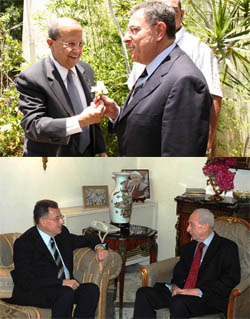 By Hussein Abdallah, Daily star. BEIRUT: Prime Minister Fouad Siniora paid a number of customary visits on Thursday, one day ahead of the mandatory parliamentary consultations that will precede the formation of Lebanon's new cabinet. Siniora met former premiers Omar Karami, Salim Hoss, Najib Mikati, Rasheed Solh, Amine Hafez and Michel Aoun. After a 45-minute meeting Aoun, who is also the leader of the opposition Free Patriotic Movement, Siniora told reporters that the talks were positive. Aoun became Lebanon's only Christian prime minister in 1988 after he was asked by former President Amine Gemayel to head an interim government as a result of the Parliament's failure to meet and elect a new president at the end of Gemayel's term.
By Hussein Abdallah, Daily star. BEIRUT: Prime Minister Fouad Siniora paid a number of customary visits on Thursday, one day ahead of the mandatory parliamentary consultations that will precede the formation of Lebanon's new cabinet. Siniora met former premiers Omar Karami, Salim Hoss, Najib Mikati, Rasheed Solh, Amine Hafez and Michel Aoun. After a 45-minute meeting Aoun, who is also the leader of the opposition Free Patriotic Movement, Siniora told reporters that the talks were positive. Aoun became Lebanon's only Christian prime minister in 1988 after he was asked by former President Amine Gemayel to head an interim government as a result of the Parliament's failure to meet and elect a new president at the end of Gemayel's term.
Siniora also contacted Muslim and Christian spiritual leaders on Thursday in advance of the consultations that are due to start on Friday afternoon. The next cabinet will include 16 ministers for the parliamentary majority, 11 for the opposition and three for the president. In a statement on Thursday, the opposition said that the Sunni opposition in Beirut should be represented by a minister in the new cabinet. "The Sunni opposition in Beirut should be represented as it is not acceptable to cross out a big portion of the capital just because one party has managed to monopolize Beirut's seats in Parliament as a result of an unfair electoral law," the statement said, referring to parliamentary majority leader Saad Hariri's sweeping victory in Beirut in the 2005 elections.
The opposition's call was not expected to be well received by Hariri's Future Movement.
Meanwhile, in an interview with BBC Arabic television on Thursday, Hariri said that Hizbullah leader Sayyed Hassan Nasrallah's recent speech has not helped calm the situation and ease tensions in the wake of violence earlier this month. Deadly clashes between opposition and pro-government militants killed at least 65 people and injured around 250 others.
Asked whether he expected Nasrallah to apologize, Hariri said that he was waiting to hear a calm speech that conformed to the agreement that was reached by the rival parties in Doha.
Hariri denied being involved in any direct talks with Hizbullah. "I am in continuous contact with Parliament Speaker Nabih Berri ... there are indirect contacts with Hizbullah," he said.
Commenting on the deadly clashes, Hariri said that the government and the March 14 Forces had shown the courage to withdraw the two disputed decisions that triggered the violence.
"The decisions were nothing but ink on paper, but my question to Hizbullah is how would they remove the blood that had been spilled in Beirut?"
Hariri insisted Hizbullah can no longer reject a discussion of the group's weapons.
Also on Thursday, Hizbullah's second in command, Sheikh Naim Qassem, told Orbit satellite television that Hizbullah was ready to discuss a defense strategy for Lebanon, but not to give up the resistance's arsenal.
"If we give up our weapons, then who would protect us and protect Lebanon from Israeli aggression?" Qassem asked.
In other developments, President Michel Suleiman received politicians and diplomats at the Presidential Palace on Thursday, including US Charge d'Affaires Michel Sison, who confirmed that President George W. Bush had recently invited Suleiman to the United States.
Sison said the US was certain that Lebanon would see peace and stability under Suleiman.
She added that the US was keen on providing military aid for the Lebanese Armed Forces.
Meanwhile, Gemayel called on Thursday for rebuilding friendly and balanced ties with Syria. "Such ties should be built on the basis of mutual respect ... my late father Pierre Gemayel used to say: if your neighbor is fine, then you're fine too," Gemayel told Syrian television.
"We should turn back the pages of our painful experience with Syria," he said.
Gemayel stressed that Lebanon should not take part in any regional or international alliance and adopt a policy of positive neutrality.
Commenting on the appointment of Siniora as prime minister, Gemayel said that the move should not be seen as a challenge to any party in Lebanon. He also pointed out that Siniora himself had called for opening a new page regarding Lebanese-Syrian relations.
Meanwhile, German Foreign Minister Frank-Walter Steinmeier said Thursday he will visit Beirut this week for talks on the Palestinian-Israeli peace process and political stability in Lebanon. Steinmeier also hailed the recent election of Suleiman, saying it "created the conditions for rebuilding the country" after years of strife.
German government spokes-man Ulrich Wilhelm said Chancellor Angela Merkel contacted Siniora on Thursday to congratulate him on his appointment as premier. - With AFP, additional reporting by Nafez Qawas